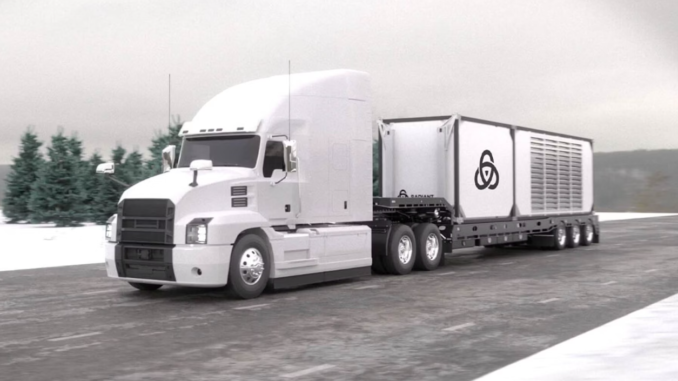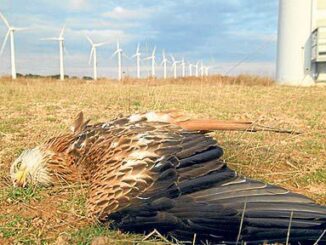
A former engineer who played a key role in launching Elon Musk’s Starship rockets into space has his own company now that could bring a thriving industrial base to Wyoming to manufacture and assemble portable micro-nuclear reactors.
The tiny power plants could be used anywhere from mining operations in Wyoming and drilling for energy along the North Slope of Alaska, to powering a huge military radar dish or electrifying a large subdivision of homes.
One megawatt of electricity equals 1 million watts or 1,000 kilowatts, roughly enough power for the instantaneous demand of 750 homes at once. That’s the amount of power the company’s portable micro-nuclear plants would produce.
Doug Bernauer, CEO of Radiant Industries Inc., a $60 million venture capital financed nuclear technologies business based along the suburban coast of Los Angeles, told Cowboy State Daily that his firm has selected Wyoming as one of five finalists to locate a factory to build these power plants. The other finalist states are Idaho, Montana, Utah and Tennessee.
“It would be a massive economic boom,” said Bernauer about the impact these tiny nuclear plants will have. “We’d be replacing diesel generators.”
Why Wyoming?
One thing Wyoming has in its favor is its rich and active uranium mining industry, which would go hand-in-hand with building nuclear generation. Then there’s its industry-friendly business climate.
“Wyoming has uranium and the lowest cost electricity in the nation,” he said, adding that there’s also the possibility of building an enrichment process for the fuel in the state, though that selection by the U.S. Department of Energy is still a few years away.
In January, the DOE began seeking bids from contractors to help establish a domestic supply of a uranium fuel enriched to higher levels for use in a next generation of reactors. That fuel is now only available in commercial levels from Russia, which is at war with Ukraine and is the target of a potential ban on purchases of low-enriched uranium by the U.S.
Some contractors involved in the procurement are said to be looking at Wyoming as a place for setting up a “vertical industry” that would include mining uranium, enriching the strategic mineral for fuel and manufacturing tiny nuclear power plants.
Radiant’s factory would require “a few hundreds of millions of dollars” of investment with a potential partner that it selects, and could be built using private equity money, federal guaranteed loans or federal awards aimed at boosting America’s uranium, enrichment and nuclear technology capabilities.
The final assembly plant would likely be built from scratch because of the specific requirements for handling nuclear fuel and waste in an already heavily regulated environment.
The portable plants measure about 10-feet high, 10-feet wide, and about 30-feet long, weighing a few tons more than a German Tiger tank from World War II, Bernauer said. They’ll weigh in at 60 tons and can be moved on a flatbed semitrailer.
Bernauer said that he got the idea of the portable nuclear power plants less than a decade ago while challenged by billionaire Musk to come up with a way to launch a superheavy rocket to the planet Mars with a 100-ton payload, then get it to fly back.
“I’m not a nuclear engineer, but I built things and operated them in a fast-paced environment,” he said. “We were looking at solar panels that were the size of three-and-a-half football fields. The numbers were awful, then Elon asked about nuclear?”
That’s when Bernauer fell in love with nuclear power, forming his own company in 2020.
An illustration showing what would be inside the 10-foot high, 10-foot wide and 30-foot long micro-nuclear plant Radiant Industries wants to build, possible in Wyoming. (Radiant Industries Inc.)
Marriage possibilities
Radiant has plenty of partnership possibilities and tradespeople that it’ll need to hire. The trades will include electricians, plumbers, welders and others.
Gillette-based L&H Industrial Inc., which provides custom manufacturing and service for heavy industrial machinery used in mining, oil and gas, railways and other industries, is high on Bernauer’s list of companies in Wyoming that could help pave the way for the factory, though no determination of a state winner is expected until the end of the year.
In recent months, L&H Industrial formed a new business unit, Evercore Energy, to chase after nuclear business. The business model is still under development, but would be a kind of one-stop shop for everything from consulting services on rolling out a small, modular nuclear reactor to assembling parts.
Gillette-based Red River LLC, a maker of pressure vessels and modular skids, also could have a role.
Bernauer said that his company is assembling a test portable nuclear power plant that will eventually be fuel tested in 2026 at the Idaho National Laboratories (INL) in Idaho Falls.
INL is one of the country’s national laboratories that performs nuclear energy research for commercial and military applications.
If the INL test goes well, the plan is to produce the first unit for a customer by 2028 and start ramping up a production line wherever the factory is built.
“Our competition are diesel generators in remote locations,” he said.
Rivals to Radiant also are working on competing designs.
They include Lynchburg, Va.-based BWX Technologies Inc., which is participating in a study with the Wyoming Energy Authority to understand the state’s “supply chain” of nuclear technology businesses; Rockville, Maryland-based X Energy LLC; and Westinghouse Electric and Manufacturing Co. LLC, based in a suburb of Pittsburgh.
Westinghouse was formed in 1999 from the nuclear power division of the original Westinghouse Electric Corp., and is owned by Brookfield Renewable Partners, a Canadian private equity fund.


